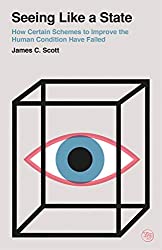Seeing Like a State has a single focus—how well-intentioned schemes to improve the human condition have failed. Specifically, it tries to answer how the pursuit of legibility and high-modernist ideals have led to disaster.
The premodern state was mostly blind. It knew little about its citizens, their wealth, landholdings and productivity. The ability to understand—or see—these things provides the groundwork for it to be manipulated.
This ability to see the capacity for large-scale social engineering. High-modernism leads to over-confidence about the mastery of nature (and human nature) and a desire to manipulate it. Authoritarian states provide the determination and means to act on that desire. An incapable civil society provides a level ground on which the state can build.
On their own the results are poor, but relatively harmless. There’s an interesting focus on failures of planned cities by Le Corbusier and his students. However, when these are combined, the results have historically been catastrophic.
While Scott’s views on high-modernism seem very one-sided, he does do a good job balancing the benefits of a legibility. Namely, efficient taxation, production and disease tracking.
Seeing Like a State was one of my favorite books this year, but I wouldn’t recommend it to most. I think the book is critical to understanding how government shapes society and the unintended consequences of those actions. If you have an interest in political science, economic systems or high-modernism, this might be for you.
There’s a lot to unpack here. If this excerpt piqued your interest, I’d encourage you to read the Slate Star Codex review.
Four elements lead to disaster
- The administrative ordering of both nature and society.
- Over confidence about scientific and technical progress. The mastery of nature and human nature. Rational design of social order depending upon scientific understanding of natural laws.
- Authoritarian state willing to use coercive power to bring its modernist designs into existence.
- A society that lacks the capacity to resist plans of the state.
